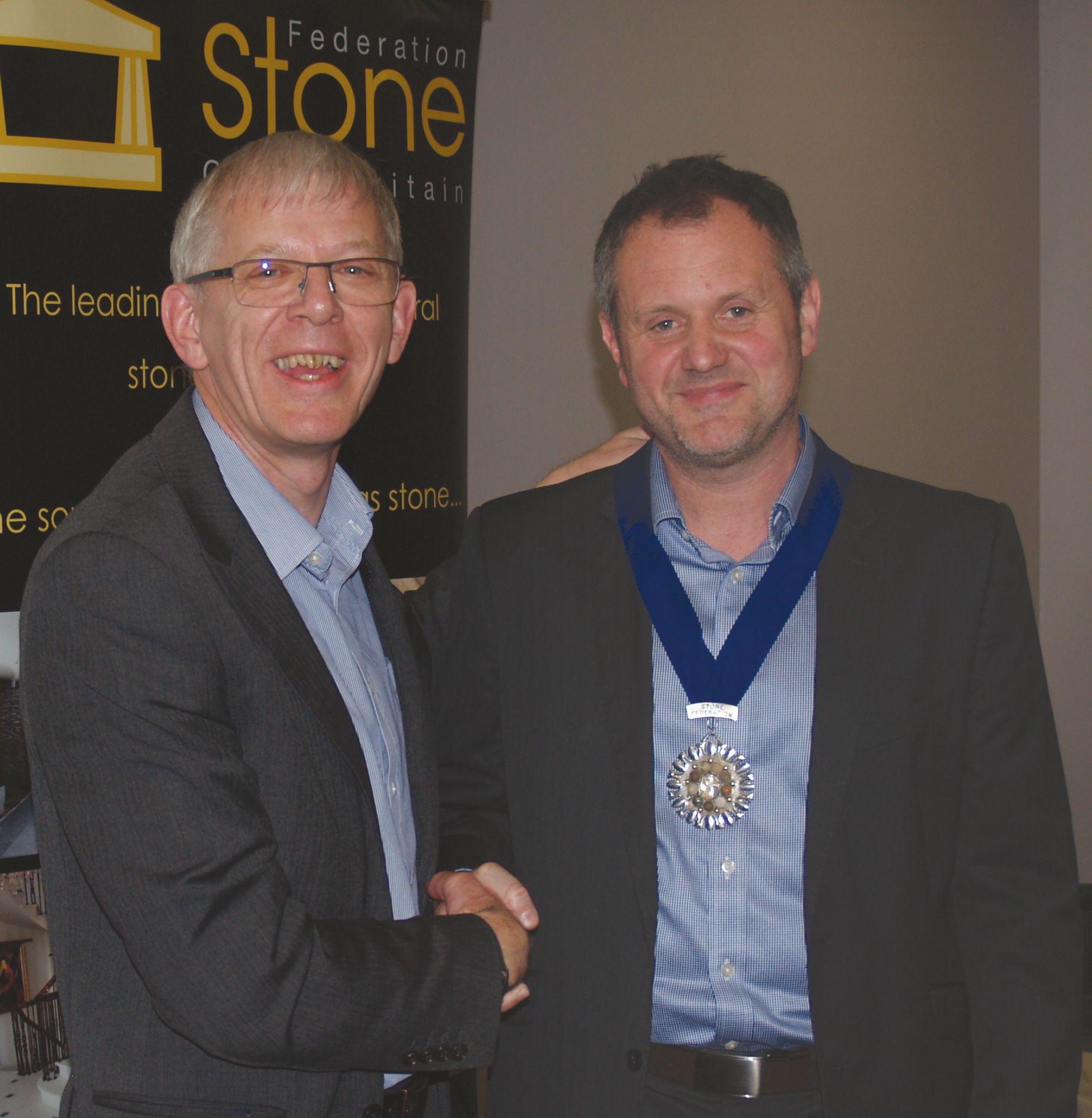Marcus Paine is the new President of Stone Federation Great Britain. He was elected at the Federation annual general meeting on 1 May that took place during the Natural Stone Show at ExCeL in London.
Marcus Paine owns Hutton Stone Company in Berwick-upon-Tweed on the Scottish borders, although he was born in Swanage, Dorset, in 1967, the second son of a Purbeck limestone quarrier. He has family links to quarrying originally in County Durham and then Purbeck stretching back five generations.
Marcus moved to the Scottish Borders, where his parents had bought a farm some years earlier, and started Hutton Stone in 1994. The company now employs 36 full-time staff, quarrying block stone and rubble walling from three quarries and producing masonry and carvings from these and many other British stones.
Marcus was already the Federation’s Quarry Forum Chairman before he became President. He actively promotes the use of natural, indigenous stone in Scotland and was one of the instigators of the Scottish Stone Group.
This is what he said in acceptance of the Presidency of the Stone Federation:
It is with a great sense of pride that I take on the mantle of Presidency of Stone Federation Great Britain. It is an enormous honour to be asked and I am pleased to accept.
I have several ideas which I have already discussed with Jane Buxey, the Federation’s Chief Executive, to take the Federation forward and I ask for your continued support into the future.
Having been born and raised in Purbeck, where my grandfather quarried one side of the wall and my father quarried on the other, I was immersed as a kid in the world of Purbeck style dimension stone extraction, where still at that time there were some who would work through heaps of block splitting walling or paving with just a hammer, a pitcher, a punch, a bar and a biddle… and while times and techniques swiftly moved on it remains true today that a hands-on sense of the material is key to understanding its possibilities and limitations.
When I moved north to start my own business I took with me all that had been learnt by my father, my grandfather and several generations of quarriers before him, originally from County Durham. In the North I found the great quarries with their colossal block sizes and long since learnt techniques to match.
Over the years I have been lucky to meet, befriend and learn from others in what I believe is a fantastic UK stone industry. There are a great many highly skilled and passionate men and women working in our trade across the UK. We are part of a rich heritage of fabulous material.
The great granites of Cornwall and Aberdeen. The many richly diverse and attractive limestones ranging across the South West to the South East of England. The hugely produced slates of Wales and Cumbria. The many great and historic sandstones cutting through the spine of the UK from Gloucestershire to Derbyshire, Yorkshire, Lancashire, Northumberland, Cumbria and still on to the Lothians, the Scottish Central Belt and right to the sea at Caithness. And, of course, in this richest of geologies of ours, the whins, dolerites, schist, gneiss, marbles and others that can be found in among it all.
These are our history. They have to a very large extent created our greatly admired heritage and they stand testament to their quality.
So I feel passionately that we should continue to remind everyone of the importance and continued relevance of this industry; the quality of its material; the skill of its workers; and of the bar level that the UK stone industry works to over many that we compete against.
I want us to celebrate the range and diversity of our material and I hope that we can make much of the progressive, ethical, sustainable, whole life and circular economy reasons for selection in design and procurement of these great materials.
As I say, I have found much to admire in many of those that design, specify, dig, work and fix natural stone and I hope we can continue to push for this skilled work to be retained in the modern tender process, so that ultimately the informed client gets exactly what they set out to achieve.
To that end, some of the areas I feel are important for the Federation:
- Continued heightened promotional activity to our key audiences through our sector groups working with ambition and budget
- Promoting and supporting the many smaller companies in the Federation as well as championing the positive input of the larger companies
- Promoting the importance of both the need to roll out the health & safety questionnaire and the Ethical Stone Register and the continued promotion of these along with the Heritage Register so that our clients have tangible reasons to value working with Federation member companies
- Championing the indigenous stone industry from operators large and small, highlighting the argument for a level playing field needed for our material against imported stone and other materials.

